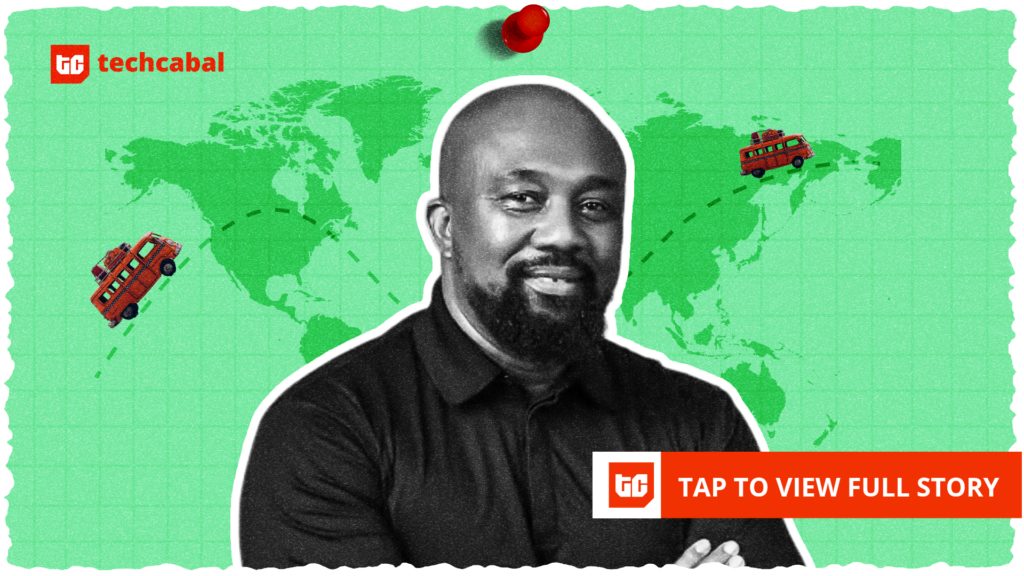Streaming is warfare. That’s how Osita Oparaugo described the business on our call. The 3x Nigerian founder, formerly chief executive of Ogelle, a content sharing app which he founded in 2019, said it was a battle fought on multiple fronts: market adoption, capital, and global competitors with deep pockets.
“I lost $18 million building Ogelle,” said Oparaugo. “Money from my pocket, my partners, family, friends, colleagues, angel investors—we all lost. I have so many stories to tell from that experience.”
Just before the turn of the decade, Oparaugo, a UK-trained investment lawyer at the time, saw an opportunity to help African creators localise and monetise their content from the jump. Ogelle billed to preserve local African languages by allowing creators to share videos made in their local dialects for fellow native speakers. Scaling a platform like that could have encouraged knowledge sharing in local languages, allowing them to become mainstream for both Africans at home and those in the diaspora looking to connect with their roots.
At its peak, Ogelle attracted a growing roster of creators and performers who saw value in a platform built for them.
“Different creatives, actors and musicians worked in one way or the other with Ogelle,” said Oparaugo.
But the dream began to unravel in an unforgiving market.
The wide-eyed boy from Owerri
Oparaugo completed high school in his home city of Owerri, in southeast Nigeria, before he travelled to Europe as a 17-year-old to study engineering in Germany. But things did not go as planned. He failed the mandatory German language course three times and never got admitted into any college in the country. Instead, he enrolled at Webster University in Leiden, the Netherlands, where he earned a diploma in international relations.
, he moved to the UK to study law at the University of Buckingham then returned to Nigeria to attend law school.
“I did the Nigerian Law School Bar Part I in 2013, and then the main Bar programme with my set, which was Bar Part II,” said Oparaugo. “For context, when you study law overseas, you are required to first complete Bar Part I, a six-month programme, before proceeding to the one-year law school.”
Oparaugo was called to the Nigerian Bar in 2014. All the time, his father had been grooming him for the family business, which spanned real estate, importation, and several agricultural interests. Oparaugo played a role in stabilising the family’s businesses, but dreamy-eyed, he eventually wanted out.
“The business was awesome, but not very challenging,” he said. “I wanted more.”
In 2016, he went back to the UK and began life as an investment lawyer. His day job was researching and advising foreign enterprises that were exploring investment and expansion opportunities in Africa.
“I had people who approached me from Brazil and said, ‘We want a mining licence in Sierra Leone or in Ghana,’” he recalled. “I also got calls to carry out due diligence on companies, countries and areas of interest for investment. So I moved around a lot.”
His career as an investment lawyer, spanning 14 African countries, gave him a unique perspective on the gaps in Africa’s digital and creative economies. Three years later, he was eager to solve some of those problems he observed.
Act 1: Ogelle
In 2019, he founded Ogelle, which was heavily compared to YouTube. The platform promised African creators a chance to tell their stories in their languages and earn directly from their content.
But Oparaugo soon learned that the streaming industry was unforgiving. Africa is not ready for paid service, especially in the streaming industry. Target customers lack the economic power to support the streaming industry, said Oparaugo.
“I see it as a deal-breaker for people in that industry, which affected us [Ogelle],” he added. “The competition was very high even globally; at some point, YouTube was delisting content creators that were dual-posting on its platform as well as Ogelle. They did it to a Rwandan creator and another person in Kenya.”
Recently, there’s been a lot of clamour for content sharing and streaming platforms that are rooted in local realities as global platforms are not built to allow African creators to win. Yet building a streaming business for this reality, in Oparaugo’s view, required more than patient capital; builders need a “whole lot of money,” and should expect to burn capital twice as fast.
During its early days, Ogelle sponsored locally-created content, and in an attempt to tap into youth culture, it even tried to incentivise and support artists to publish their music videos on its app. Once, it financed Laycon, a rapper and winner of a reality contest show, to shoot his “Nobody” music video, and publish it on Ogelle before taking it to YouTube. But that move turned out to be ill-advised as the platform wasn’t prepared for the kind of traffic it brought. The gamble backfired.
“The influx of viewers crashed Ogelle,” said Oparaugo. “At the time, Ogelle was on Amazon [web services] but it was running on a different elastic model. We were down for three hours, but our users—and even DJ Neptune who violated our contract and went ahead to publish on YouTube—were impatient and unforgiving; we never recovered.”
Ogelle shut down in April 2024 after years of wobbling.
Act 2: GetBundi
After Ogelle, Oparaugo turned his focus to edtech. He founded GetBundi, a startup that supports science, technology, engineering, and mathematics (STEM) education for post-primary school kids and digital skills training for older Africans.
“I built Ogelle to give African youths, especially those in the creative industry, a voice,” he said. “I wanted a world where more talented young people could expressively be themselves and connect with a world that rewarded them for that uniqueness.”
GetBundi, in his words, is a continuation of that mission but in education. The company created post-primary STEM courses under the West African curriculum and developed 16 digital skill programmes, including DevOps, cybersecurity, product management, robotics, and data science, for digital skills training. The modules are delivered by over 100 facilitators across Africa and beyond.
In Nigeria, GetBundi has collaborated with the National Information Technology Development Agency (NITDA) to co-create a digital literacy framework.
“Nigeria wants to achieve 70% digital literacy level by 2027 under a programme called ‘Digital Literacy For All’; GetBundi created the courses for NITDA and we hold property licences under several course competencies,” said Oparaugo.
The edtech platform is now adapting its educational content to the Southern African curriculum to appeal to more educators in the region.
Oparaugo believes Africa must move from being a consumer of knowledge to a creator of it. GetBundi is his contribution to that goal of making Africa a digital powerhouse.
“The Philippines makes over $30 million from business process outsourcing (BPO) companies,” he said. “Why can’t African talent attract global BPOs as a way of creating jobs?”
Act 3: Doballi
That question inspired his third company, Doballi, a talent development and global recruitment platform.
“Doballi was a response to the recruitment gap. Beyond training Africans and upskilling them, what next?” he said, asking rhetorically. “We wanted to bridge the gap between the talent in Africa with global opportunities.”
Doballi is invitation-only, vetting talent through exams and grading them against set skill benchmarks for different courses. This makes it easier to recommend African talents to global employers based on the profiles and skill levels recruiters are looking for; it eases the burden on these employers which Doballi partners with.
“Global American firms wanted to hire Africans, but they said the problem was to hire two or three persons, they have to interview 100 of them. It was a hit or a miss, and it was cumbersome,” said Oparaugo.
With GetBundi providing the training and Doballi providing visibility, his vision is to create a pipeline of world-class African talent ready for global employment.
Battle scars
For Oparaugo, Ogelle left plenty of battle scars. The platform never had the support structure it needed to thrive. There was no government backing for a product Oparaugo strongly believed had cultural significance, no local funding to keep the lights on, and the average African viewer simply did not have the purchasing power to buy viewing rights.
Ogelle’s model relied on people paying to watch premium content, with revenue shared with creators who posted original work. But the economics never lined up. Advertisers, including local companies, chose to place their budgets with foreign platforms rather than risk money on a homegrown experiment.
Through it all, Oparaugo held his ground with his investors.
“Integrity wins in any business,” he said. “I run a transparent business. And my investors are carried along through every investment and finances are monitored. I run my companies like an open book.”
The transparency paid off. One of his earliest backers, despite losing money in Ogelle, stayed with him for his next ventures, and even through a potential comeback for the streaming platform.
“We overestimated the market in our first act,” he said. “We have to fix that by truly understanding who we want to create Ogelle for. In two years, [Ogelle] is coming back as a different product.”
His other ventures, based in Nigeria and Dubai, show the mark of someone who has learned to build across borders. Ogelle was headquartered in Rwanda. GetBundi, his edtech startup, takes root in Nigeria—and borrows its name from the Swahili word for owl,a bird that embodies wisdom in folklore. Doballi, the talent platform, sits in Dubai, UAE. His constant movement has influenced how he approaches business.
Looking back, Oparaugo admits the pain of Ogelle still lingers, but he frames it as a necessary apprenticeship.
“Building anything is not a walk in the park,” he said. “You can’t be partying at night clubs on weekends; you have to put in the shift without switching off. You’re building for Africa; it’s hard business. You have to pay that price.”
Mark your calendars! Moonshot by is back in Lagos on October 15–16! Join Africa’s top founders, creatives & tech leaders for 2 days of keynotes, mixers & future-forward ideas. Early bird tickets now 20% off—don’t snooze! moonshot..com










